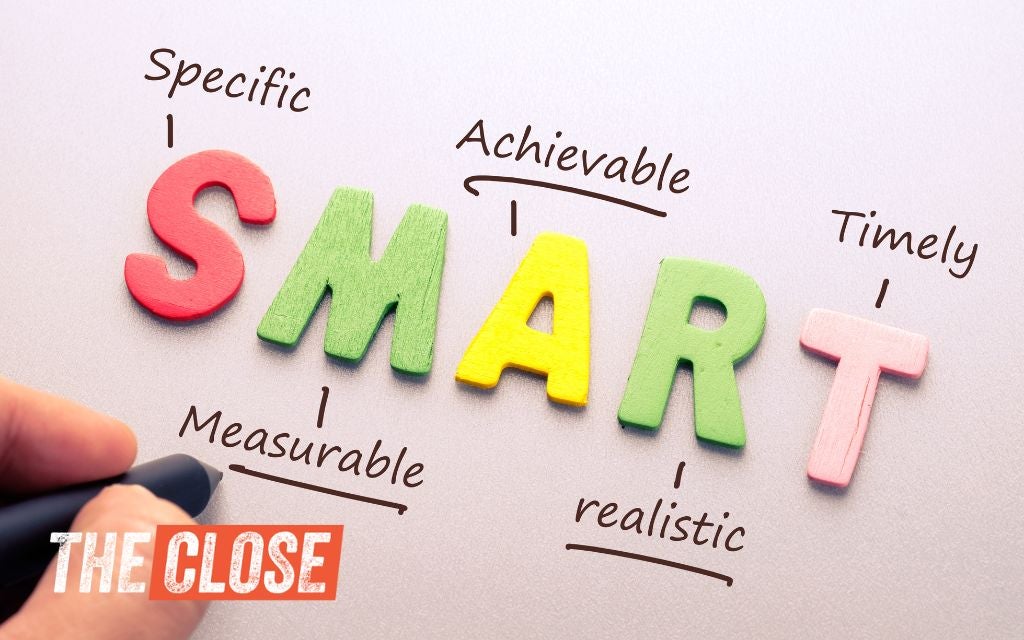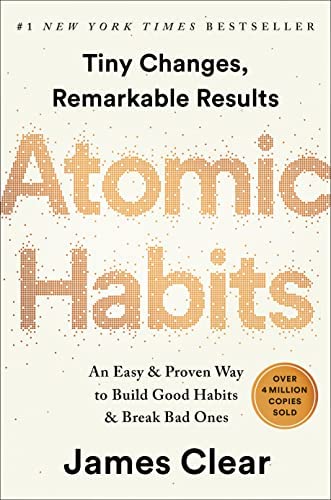Being a real estate agent isn’t just a job—it’s a business, and you need to treat it like a business. That means setting measurable real estate agent goals and developing habits to help you realize your goals. At The Close, we feel strongly about setting the right goals, specifically “SMART” goals, to advance your success. I’ll explain SMART goals and how to establish vital real estate agent goals, provide examples, and give you actionable tips on developing a successful agent’s habits.
What Are SMART Goals?

Tony Robbins says, “Setting goals is the first step in turning the invisible into the visible,” and that’s where SMART goals come into play. Setting specific and measurable realtor goals with deadlines encourages you to visualize the concrete ideology needed to achieve them. Use your goals to establish a game plan for scaling your business to the next level.
When setting SMART real estate goals, it’s important to ensure you’re applying the right type of goal-setting strategy. Following the SMART model will help you draft concrete goals with deadlines, which makes you more likely to stick to them. For real estate goal-setting, use this table as a guide to write down your goals using the SMART model.
| Acronym Defined | |
| Specific | |
| Measurable | |
| Achievable | |
| Relevant | |
| Time-bound |
Examples of Fully Constructed SMART Goals
I’ve listed a few examples of real estate goals to give you an idea of how to build your own for your real estate business.
Example 1
I will build my knowledge of commercial real estate properties by reading five commercial real estate books by the end of quarter two (June 30th).
- Specific: Focus on building knowledge of commercial real estate properties
- Measurable: The goal is to read five books, a measurable number
- Achievable: Five books in six months is achievable if spaced out appropriately
- Relevant: Reading real estate books to increase knowledge is relevant to my business
- Time-bound: The end of quarter two gives you several months to complete it
Example 2
I will make 20 phone calls per day, five days per week, to prospects, leads, and my sphere of influence. I will also make 20 cold calls (FSBOs and expireds) and set two appointments per week. I will add two new listing clients per month.
- Specific: Focus on setting appointments with potential listing clients
- Measurable: 20 calls to your sphere and 20 cold calls are measurable numbers
- Achievable: Making 40 calls each day to set two appointments each week is achievable
- Relevant: Making calls to set two appointments each week is relevant to acquiring listings
- Time-bound: This is a daily goal that prioritizes the task over the outcome
Example 3
I will improve my branding strategy by taking a branding course to learn how to promote my business. The course includes seven self-paced modules. I will complete two weekly modules and then implement the steps I learned that week.
- Specific: Focus on developing a branding strategy to grow your business
- Measurable: The course included seven modules to be completed within eight weeks
- Achievable: Two modules per week is an attainable goal
- Relevant: A branding course is a great way to improve lead generation and brand awareness
- Time-bound: Eight weeks gives you a manageable deadline to complete the course
Example 4
I will read a real estate book each month to better understand how to scale my business in a sustainable way.
- Specific: Focus on scaling your real estate business in a sustainable way
- Measurable: The goal is to read one book each month
- Achievable: One book each month is doable; perhaps audible books make it even easier
- Relevant: Reading real estate books improves knowledge which is in line with business goals
- Time-bound: The deadline is one book per month
Example 5
I will develop a plan to post on social media every day for a month by following a marketing plan and calendar.
- Specific: Focus on building a social media presence and developing consistency
- Measurable: The goal is to post once each day on social media, which is measurable in days
- Achievable: One post per day is achievable, especially if scheduling posts in advance
- Relevant: Posting on social media generates real estate leads and builds brand awareness
- Time-bound: This is a daily goal to be reassessed at the end of each month
Example 6
I will earn my Accredited Buyer’s Representative / ABR® designation by June 30th.
- Specific: Focus on learning to be a buyer’s agent and attaining designation
- Measurable: The goal is to earn the designation by the end of the second quarter
- Achievable: The course is two days plus an elective, which could take as few as three days
- Relevant: A designation is a great way to expand knowledge on how to serve buyer clients best
- Time-bound: The end of quarter two gives you several months to complete the course
Additional Examples
- I will sell 20 homes in 2024. Increase GCI by 20% year-over-year (YoY) in 2024 by adding two additional real estate prospecting methods to my overall marketing strategy.
- I will hold two open houses per week. Follow up with every open house attendee who signs the sign-in sheet. Set one new buyer appointment per week.
- I will send out 20 handwritten cards per week to my farm, sphere of influence, and network. Set one listing appointment per week.
- I will sell one more home per month than last year. (Or sell 24 homes by December 31, 2024.)
- I will take a course on creating social media ads by June 1, 2024, and implement one new strategy each week after completing the course.
- I will host and plan a homebuyers event each quarter of the year—February 21, May 15, August 21, and October 23—to educate potential homebuyers in my area.
- Send 100 postcards to my geo-farming area each month in 2024.
- Complete 14 hours of CE credit by September 1, 2024.
Use these examples to help you structure your own SMART goals. Don’t wait until January to develop your goals—you can start a new plan today and put it in place to achieve success as a real estate agent by the end of the year.
How to Craft SMART Real Estate Goals
Setting your SMART goals in real estate takes a bit of practice, but I’m taking you through the process one step at a time. Whether you’re setting your Big Hairy Audacious Goals, or BHAGs, for the next five years or you’re focused on your shorter-term goals in your GCI and production, using these strategies will help you make the most of your goal-setting. Here are the five elements to create your own SMART goals to become the rock star agent you want to be.

Step 1: Be Specific
When setting your goals, target a specific area of improvement and what you want to accomplish. Instead of saying you want to make more money, invest in more education, or sell more homes in 2024, make it more concrete. How much more money do you want to make? What type of education will you invest in? How many homes will you sell in 2024?
Step 2: Make Them Measurable
Always include a way to measure your success with your real estate agent goals. Track your progress and adjust your activity to stay on track with your longer-term goals. Reverse engineer your goals to find what activities you’ll need to accomplish to reach those goals.
Step 3: Keep Them Achievable
It’s great to have BHAGs for year-over-year growth. But for short-term success, which inevitably leads to long-term success, include some smaller, more achievable real estate goals that you can easily see to keep you motivated. Focus on the activity instead of the end result. If you focus on making 20 calls daily, the appointments will happen as a result.
Step 4: Make Sure They Are Relevant
Make sure the goals you set align with your overall business objectives. It’s best to focus on the goals directly relevant to your production goals. You can work towards becoming a superstar on Instagram with 5,000 followers, but if it doesn’t directly impact your business growth, it’s not helping you achieve your objectives.
Step 5: Give Yourself a Deadline
Everything with a deadline should be completed on time. This is an opportunity for you to work on your time management skills. If you don’t give yourself a deadline to accomplish your tasks, goals, or anything else, they will languish on the “to-do” list forever.
Why Should Real Estate Agents Set Goals?
If you want to crush it in this business, you must set some serious goals. I’m talking about the kind of goals that light a fire under your butt and keep you laser-focused on what matters most. Without goals, you’re just drifting along, hoping for the best. But when you have a clear target to aim for, you’re unstoppable.
Setting goals isn’t just about dreaming big, though. It’s about holding yourself accountable and making things happen. When you have specific goals to work toward, you’re more likely to take action and push yourself outside your comfort zone. And when you finally achieve those goals, that feeling of accomplishment is like jet fuel for your motivation.

Process for Choosing the Right Real Estate Agent Goals
Okay, so you know you need goals. But how do you choose the right ones? It starts with a little self-reflection. Take a hard look at where you are now and where you want to be. I’m sure you’ve been following tons of actionable real estate agent tips, so what’s working well? What could be better? What do you really want to achieve in this business?
Once you’ve got a handle on that, it’s time to put those intentions down on paper. Goal-setting for real estate agents can make a good agent great. Make sure your goals are challenging but doable and that they actually matter for your career. Focus on the goals that will make the biggest impact first.
Short-term vs. Long-term Real Estate Agent Goals
Now, let’s discuss the difference between short-term and long-term goals. Both are important, but you need a mix to keep yourself motivated and on track.
- Short-term goals: You can knock out these goals in a few months to a year. For example, closing a certain number of deals this quarter or earning a specific commission income by the end of this year.
- Long-term goals: These might take a few years to achieve. For example, becoming the go-to agent in your market or building a team of rockstar agents to work with you.
The key is ensuring your short-term goals are stepping stones to those bigger, long-term objectives.
Goals for Experienced Vs. New Agents
Your goals might change depending on your experience level. If you’re following a new agent checklist, your focus is probably on building your client base and getting those first few deals under your belt. You might set goals around attending a certain number of networking events or getting a specific number of leads each week. Obviously, real estate goals for new agents are about getting your business up and running.
But your goals might look slightly different if you’re a seasoned pro. Maybe you’re focused on expanding your business, gaining your broker’s license, or branching into new niches like luxury homes or commercial properties. You might set goals around improving your marketing game or implementing new tech tools to streamline your processes. The key is to keep challenging yourself and pushing the boundaries of what’s possible.
Tips for Developing Better Habits to Reach Your Real Estate Goals
If you want to achieve your goals, then you need to level up your habits. As Aristotle once said, “We are what we repeatedly do.” So if you want to become a successful agent, you must master the habits of a successful agent. Magic happens in the smallest details that make up each day.
James Clear, in his book, “Atomic Habits,” provides actionable ways to break free of bad habits and adopt new habits to help you achieve your goals almost on autopilot. Definitely pick up the book to get more in-depth on the topic. For now, I’ll share some tips from his book to help you develop better habits and give you a jumpstart on your goals. Check out Clear’s book on Amazon.
“You do not rise to the level of your goals. You fall to the level of your systems.”

Tip 1: Don’t Give Up
According to Clear, many people enthusiastically start a new habit but don’t see the results immediately and give up. The social media age has significantly reduced our ability to delay gratification! But here’s the truth: habits compound over time, so you may not see results right away. But if you put solid systems in place and stick to them, you will see the breakthrough happen.
Tip 2: Set Up Systems
Use your SMART goals to determine what systems you need to put in place. Because even if you had no goals but had great systems in place, you would most likely achieve a marked improvement in your business. On the flip side, if you have goals but no systems, the opposite would most likely be the outcome. So reverse engineer your goals to set processes in place to help you achieve them.
For example, if you know what your gross commission income (GCI) goal is for the year, what do you need to accomplish to achieve that goal? Is it 24 transactions? Once you know the answer, think about what systems and habits you need in place to hit your financial goals. Then stick to those processes daily because success comes with consistency.
Tip 3: Focus on Your Identity
Become less focused on your outcomes and more focused on your identity. Be the person who achieves, as opposed to chasing a goal. For example, if you are currently fixated on the outcome of doubling your GCI, instead focus on changing your identity to someone who calls prospects every single day.
Also, acknowledge that issues that make it hard to stick to your habit might pop up in your life. Give yourself some grace…, but not too much. Never miss more than one day of skipping out on your new habit or identity.
Tip 4: Understand Your Habit Loop (Triggers)
Know that you have a habit loop or a cue that you automatically respond to. Learning to recognize your triggers can help you change your behavior around them.
For instance, if you check social media every time you hear your phone make a noise, you know firsthand what a cue and a response are like. Create an environment where you are more likely to stick to your desired habit (e.g., no phone in the room when you’re working on updating your CRM).

Your environment is filled with cues that either work for or against you. Know which environments are most conducive to your habits. When devising a new habit, follow this formula: “I will do x at this time at this location.” The specificity helps you identify that location as a cue for your new habit.
Tip 5: The Temptation Bundling Technique
You might need to form habits you do not like (e.g., cold calling). Clear suggests using a temptation bundling technique for instances like this.
That means right after you do something you do not like, reward yourself with something you do enjoy.
Doing this will flood your brain with the feel-good hormone dopamine. You will start to associate the dreaded habit with feeling good. The thought of doing it every day will become less and less awful.
Bringing It All Together
Knowing what goals you want to go after provides direction, and good habits help you get there. Whether you’re thinking about what you want to achieve next year or are reading this during a midyear reset, know that the small tweaks you make to your daily habits compound over time. Dream big, but start taking small, daily actions with reasonable expectations.
What are your big real estate goals for 2024? And what habits do you count on using to make them a reality? I’d love to hear your thoughts. Drop a comment below, and be sure to add any tips that you think would be helpful for others.











